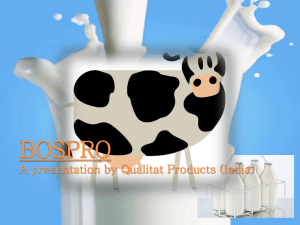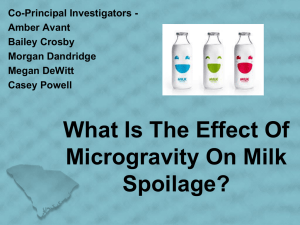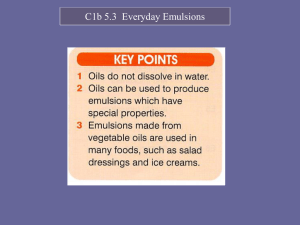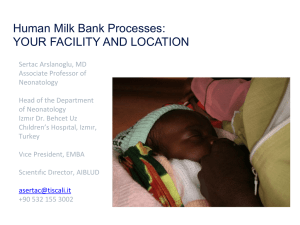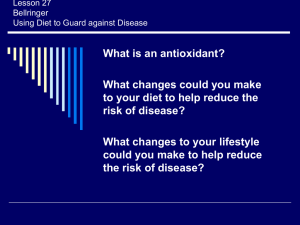Importance of Flavored Milk Presentation
advertisement
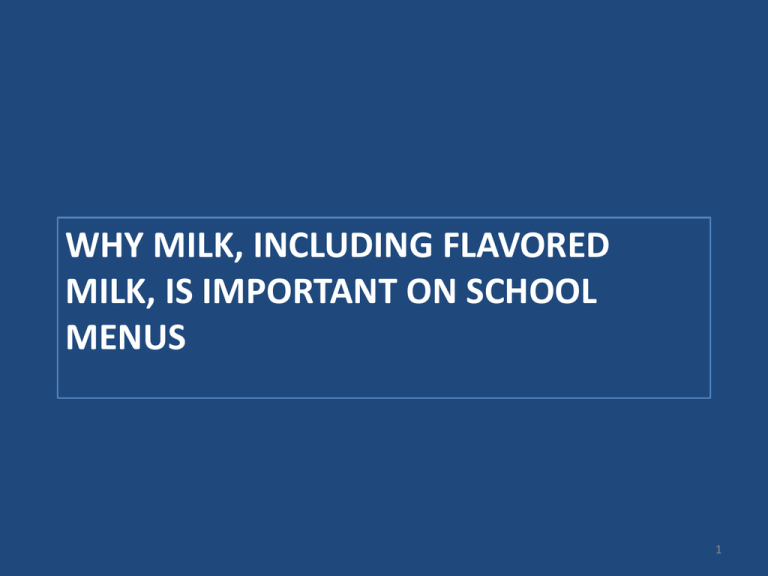
WHY MILK, INCLUDING FLAVORED MILK, IS IMPORTANT ON SCHOOL MENUS 1 What are parents saying about flavored milk? • Analysis of online conversations shows the majority of moms actually oppose bans on chocolate milk. o The majority of moms oppose bans on chocolate milk. The vocal minority (approximately 5% of parents) have a louder voice than the moderate majority. • Reasons why parents oppose bans on chocolate milk include (based on analysis of online conversations): o Choice: Parents want children to learn to make choices and do not want decisions made for them. o Misplaced Priorities: Parents want schools to focus on issues like quality of education. o Reality: Parents appreciate that some kids won’t drink white milk, and chocolate milk is a way to get their children to drink milk and consume the nine essential nutrients found in milk. o Incomplete story: Parents realize that obesity is caused by many factors, including lack of exercise. o Nostalgia: Parents remember drinking and liking chocolate milk themselves. FACTS ABOUT FLAVORED MILK Chocolate Milk Has the Same 9 Essential Nutrients as White Milk Source: USDA-NNDSR 4 Flavored milk provides 3 of 4 nutrients of concern Americans need1 1. 2. Dietary Guidelines for Americans, 2010 Dairy Research Institute 2010 NHANES 2003-06 5 A tasty way for kids to get nutrition Children who drink flavored milk have better quality diets Milk drinkers (including flavored) have higher intakes of calcium, vitamin A, phosphorus, magnesium and potassium than non-drinkers Flavored milk drinkers consume more milk and less soda and fruit drinks than kids who don’t drink flavored milk Children who drink flavored milk do not have higher intakes of added sugars or total fat than children who do not consume flavored milk BMI of white and flavored milk drinkers are comparable to or lower than kids who don’t drink milk Johnson, et al. The nutritional consequences of flavored milk consumption by school-aged children and adolescents in the United States. J Am Diet Assoc. 2002;102(6): 853-856. MM Murphy, JS Douglass, RK Johnson, LA Spence. Drinking flavored or plain milk is positively associated with nutrient intake and is not associated with adverse effects on weight status in U.S. children and adolescents. J Am Diet 2008;108:631-639. 7 Average flavored school milk has 32 fewer calories than five years ago Avg. Calories in 8 oz. of Flavored Milk • The average flavored milk serving in schools this Fall will be 134 calories 166.1 • Flavored milk will be only 31 calories more than the white milk in school 154.0 142.8 134.2 • 66% of Processors report newly reformulated product will be offered this Fall '06-'07 '09-'10 '10-'11 '11-'12P • The most common Chocolate offering will be fat free with 130 calories and only 10 added grams of sugar AVERAGE CALORIES PER 8 OZ OF MILK IN SCHOOLS ’06-’07 ‘11-’12P White 110.8 103.1 -7.7 calories -7% Flavored 166.1 134.2 -31.9 calories -19% TOTAL 150.0 124.6 -25.4 calories -17% 2011-2012 Projected School Milk Product Profile, Prime Consulting Group Flavored milk contributes just 3% of added sugars to kids’ diets Note: Chart represents average values Source: NHANES (2003-2006), Ages 2-18 yrs 9 The value of milk on the menu • A study showed eliminating flavored milk from elementary schools resulted in a dramatic drop in milk consumption (35%). 1 • It can be difficult and expensive to replace the nutrients lost from decreased milk intake in school meals. o Even if a lunch included orange juice fortified with calcium and vitamin D, a school would still need to add ½ cup of diced cantaloupe, 3.5 ounces of apple with skin and ½ cup of cooked baked beans to a child’s meal just to make up the nutrients lost in one glass of milk. o And, those additional foods add 171 more calories to a child’s diet than simply drinking chocolate milk. 1 The Impact on Student Milk Consumption and Nutrient Intakes From Eliminating Flavored Milk in Schools, Milk Processor Education Program, 2010. Dairy Industry Support Reformulation efforts are supporting school’s requests for healthier products Fat-free flavored milk options Lower added sugar levels Lower calorie levels 95% of Flavored milk in schools projected to be under 150 calories in 2011-12 Portion of Flavored Milk ≤ 150 Calories 94.8% 68.2% 77.8% 38.2% Average Calories in 8 oz. Serving of Flavored Milk '06-'07 '09-'10 166.1 154.0 '06-'07 2011-2012 Projected School Milk Product Profile, Prime Consulting Group '09-'10 '10-'11 '11-'12P 142.8 134.2 '10-'11 '11-'12P -31.9 Calories (-19.2%) School milk is lower in fat than milk in the general market 0.4% 26.54% 37.8% 0.4% 4.1% 21.0% Whole 2% 1% .5% Fat Free White milk at retail 1.78% White AVG FAT LEVEL 2010-2011 MilkPEP Annual School Survey, Prime Consulting Group 1.126% Schools 0.79% Flavored 0.64% Added sugar has declined 38% (in school chocolate milk) The total sugar level in Chocolate milk has declined by 6 grams per serving over five years. Added sugar has declined 38% (from 16.7g to 10.4g), while the sugar from cow’s milk (lactose) has not changed (~12g per serving). Grams of Sugar per 8oz Serving '06-'07 12 16.7 '10-'11 12 11.8 '11-'12 10.4 12 White Added 2011-2012 Projected School Milk Product Profile, Prime Consulting Group Equivalent Teaspoons 4.0 2.8 2.5

